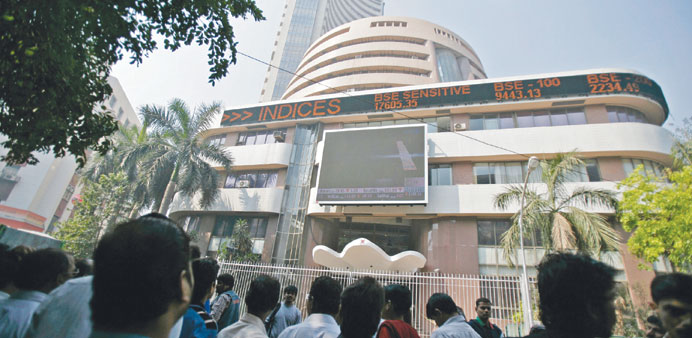Bloomberg
Mumbai
Indian stocks declined, with the benchmark gauge capping its worst August in almost four years, before the release of growth data and as foreigners withdrew the most money from shares since October 2008 amid a global sell-off.
Bharat Heavy Electricals, a power-equipment maker, fell to a three-month low. Oil & Natural Gas Corp, the largest explorer, slid 1.8%, ending a two-day, 8.4% rally. Reliance Industries, owner of the world’s largest oil refinery, dropped for the first time in five days. Bharti Airtel, India’s biggest telecom operator, was among the worst performers on the S&P BSE Sensex.
The Sensex retreated 0.4% to 26,283.09 at the close in Mumbai after changing direction at least six times. The gauge tumbled 6.5 in August, the most since November 2011, as overseas funds pulled $2.52bn from local stocks this month. That’s the biggest withdrawal since October 2008. The MSCI Asia Pacific Index slid 0.8% Monday amid concern the US will push ahead with raising borrowing costs as soon as September, despite the prospect of further volatility in Chinese equities.
“India is part of the emerging-markets basket and if there’s a risk-off trade it cannot be insulated,” UR Bhat, a director at the Indian unit of Dalton Strategic Partnership LLP, a UK-based investment management company, told Bloomberg TV India yesterday.
Sentiments also soured after Prime Minister Narendra Modi stepped back from a move to make it easier for companies to buy land after increased opposition from farmers ahead of a key election. Polls in the state of Bihar are crucial to controlling the upper house of parliament, where opponents have blocked the land bill and Modi’s other key economic proposals.
“Overseas investors are concerned about the progress of legislative and non-legislative actions by the government,” said Bhat. “Investment-led economic growth must happen through the government as the private sector is not in a mood to buoy investments.”
The Sensex trades at 14.9 times projected 12-month earnings, compared with a multiple of 10.6 for the MSCI Emerging Markets Index. The CNX Nifty Index dropped 0.4% to 7,971.30. The Sensex has plunged 6.5% in August, the biggest retreat since November 2011.
Bharat Heavy dropped 3.5%, extending last week’s 5.7% decline. Oil & Natural Gas fell for the first time in three days, while Reliance lost 1.9% to 855.9 rupees. Bharti Airtel slid 2.3% to Rs354.3.
Lupin, Sun Pharmaceutical Industries, Cipla and Dr Reddy’s Laboratories, the nation’s largest health- care companies by value, were the best performers on the Sensex as some investors bought defensive stocks.
Meanwhile, the Indian rupee completed its biggest monthly retreat since August 2013 as global funds exited local shares amid an emerging-market rout sparked by China’s yuan devaluation.
Outflows from equities totaled $2.52bn this month through Thursday, the most since October 2008. A gauge of Asian exchange rates posted its biggest monthly decline in three years as China’s August 11 depreciation of the yuan heightened the risk of a regional currency war just as the US prepares to raise interest rates. Investor sentiment toward India could weaken further after Prime Minister Narendra Modi on Sunday stepped back from pushing through one of the nation’s biggest economic reforms.
The rupee slid 3.5% this month and 0.5% yesterday to 66.4825 a dollar in Mumbai, prices from local banks compiled by Bloomberg show. The currency sank to an unprecedented 68.845 in August 2013 after the Federal Reserve’s signal to end bond purchases caused an exodus of funds from emerging-market assets. Vietnam also devalued its currency this month while Kazakhstan relinquished control of its exchange rate.

